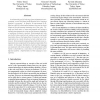Free Online Productivity Tools
i2Speak
i2Symbol
i2OCR
iTex2Img
iWeb2Print
iWeb2Shot
i2Type
iPdf2Split
iPdf2Merge
i2Bopomofo
i2Arabic
i2Style
i2Image
i2PDF
iLatex2Rtf
Sci2ools
111
click to vote
ICSE
2005
IEEE-ACM
2005
IEEE-ACM
An adaptive object model with dynamic role binding
To achieve the goalof realizingobject adaptationto environments, a new role-based model Epsilon and a language EpsilonJ is proposed. In Epsilon, an environment is defined as a field of collaboration between roles and an object adapts to the environment assuming one of the roles. Objects can freely enter or leave environments and belong to multiple environments at a time so that dynamic adaptation or evolution of objects is realized. Environments and roles are the first class constructs at runtime as well as at model description time so that separation of concerns is not only materialized as a static structure but also observed as behaviors. Environments encapsulating collaboration are independent reuse components to be deployed separately from objects. In this paper, the Epsilon model and the language are explained with some examples. The effectiveness of the model is illustrated by a case study on the problem of integrated systems. Implementation of the language is also reported.
Environments Encapsulating Collaboration | ICSE 2005 | Realizingobject Adaptationto Environments | Role-based Model Epsilon | Software Engineering |
Related Content
| Added | 09 Dec 2009 |
| Updated | 09 Dec 2009 |
| Type | Conference |
| Year | 2005 |
| Where | ICSE |
| Authors | Tetsuo Tamai, Naoyasu Ubayashi, Ryoichi Ichiyama |
Comments (0)

